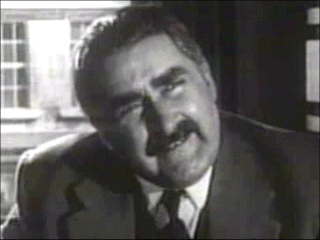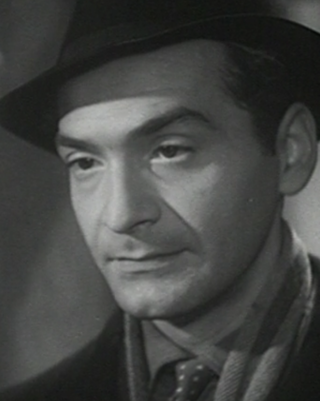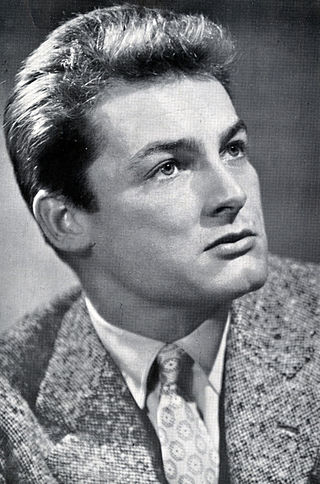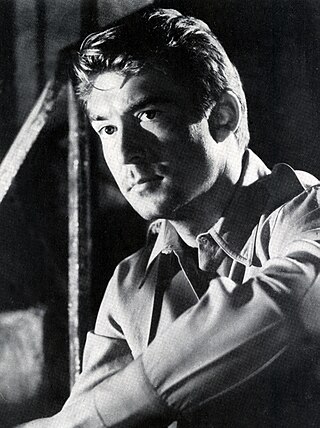Renato Montalbano | |
|---|---|
 Montalbano in Psycosissimo (1961) | |
| Born | 17 May 1931 Catania, Italy |
| Occupation | Actor |
Renato Montalbano (born 17 May 1931) is an Italian character actor.
Renato Montalbano | |
|---|---|
 Montalbano in Psycosissimo (1961) | |
| Born | 17 May 1931 Catania, Italy |
| Occupation | Actor |
Renato Montalbano (born 17 May 1931) is an Italian character actor.
Born in Catania, in 1955 Montalbano abandoned his university studies in medicine to attend at the Centro Sperimentale di Cinematografia in Rome, from which he graduated in 1957. [1] He made his film debut in 1956, and he was among the most active character actors in Italian cinema for about thirty years, alternating genre films and auteur films. [1] Montalbano was also very active on television, where he debuted in 1958 and appeared in dozens of television films and miniseries, often in prominent roles. [1]

Sword-and-sandal, also known as peplum, is a subgenre of largely Italian-made historical, mythological, or biblical epics mostly set in the Greco-Roman antiquity or the Middle Ages. These films attempted to emulate the big-budget Hollywood historical epics of the time, such as Samson and Delilah (1949), Quo Vadis (1951), The Robe (1953), The Ten Commandments (1956), Ben-Hur (1959), Spartacus (1960), and Cleopatra (1963). These films dominated the Italian film industry from 1958 to 1965, eventually being replaced in 1965 by spaghetti Western and Eurospy films.

Renato Terra, also known by the alias Ryan Earthpick, was an Italian actor and later a poet.

Francis Marie de Wolff was an English character actor. Large, bearded, and beetle-browed, he was often cast as villains in both film and television.

Livio Lorenzon was an Italian actor who was mainly active during the 1950s and 1960s.

Peter van Eyck was a German-American film and television actor. Born in Prussian Pomerania, he moved to the United States in the 1930s and established a career as a character actor. After World War II, he returned to his native country and became a star of West German cinema.

Andrea Checchi was a prolific Italian film actor.

Renato Ranucci, known by the stage name Renato Rascel, was an Italian film actor and singer. He appeared in 50 films between 1942 and 1972. He represented Italy in the Eurovision Song Contest 1960 with the song "Romantica", which tied for eighth place out of thirteen entries.

Nerino "Nerio" Bernardi was an Italian stage and film actor. He appeared in nearly 200 films between 1918 and 1970.

Carlo Tamberlani was an Italian film actor. He appeared in 127 films between 1931 and 1976. His brother Nando Tamberlani was also an actor.

Alessandra Panaro was an Italian film actress of the late 1950s and early 1960s.

Dante Maggio was an Italian film actor. He appeared in 115 films between 1940 and 1975.

Maurizio Arena was an Italian film actor. He appeared in more than 70 films between 1952 and 1978.

Fausto Tozzi was an Italian film actor and screenwriter. He appeared in 70 films between 1951 and 1978. He wrote the script for The Defeated Victor, which was entered into the 9th Berlin International Film Festival. He also directed one film, Trastevere.

Lorella De Luca was an Italian film, television, and voice actress. One of the most recognized ingénues of Italian cinema during the mid-to-late 1950s, she is best known for having played naive young girls in dramas and comedies.

Domenico "Mimmo" Palmara was an Italian actor.

Luisella Boni is an Italian actress.

Roberto Risso was a Swiss-born Italian film actor.

Mirko Ellis was a Swiss-Italian film, stage and television actor.

Andrea Aureli was an Italian actor.

Antonio Cifariello was an Italian actor and documentarist.